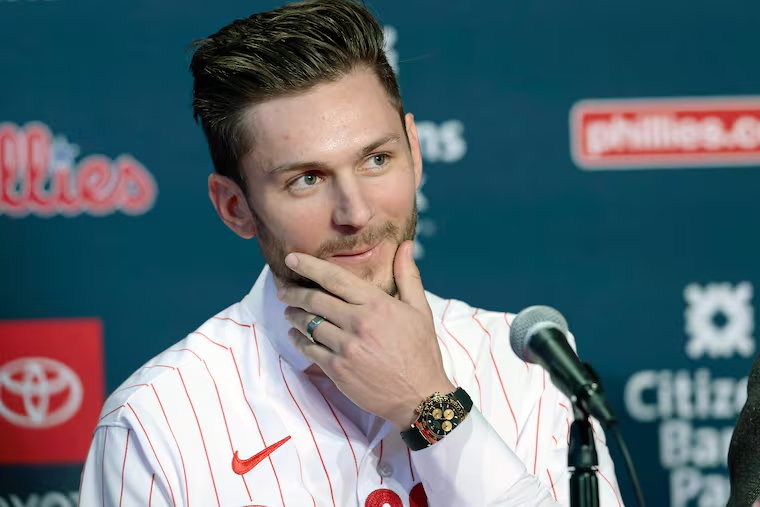Why new Phillies star Trea Turner isn’t concerned about the WBC disrupting his spring training
The $300 million shortstop believes MLB’s new rules will make certain aspects of the game (defense) less complicated and amplify his skills in other areas (baserunning).

Before the Phillies made their best offer to prized free-agent shortstop Trea Turner, owner John Middleton got a phone call from president of baseball operations Dave Dombrowski.
“Do you believe this guy is a difference maker?” Middleton asked.
“He’s one of the 10 best players in baseball,” Dombrowski said.
Middleton shared details of that conversation with The Inquirer in December, hours after the Phillies and Turner agreed to an 11-year, $300 million contract. They’re worth retelling now because Turner is due to arrive in Clearwater, Fla., on Wednesday and pull on a red batting practice jersey Thursday for his first spring training workout, a visual reminder that the defending NL champs really did sign one of the most dynamic players in the game and a proper heir to Jimmy Rollins at shortstop.
» READ MORE: What the shortstop aging curve means for the Phillies’ 11-year contract with Trea Turner
Take a good look at him now, though. Because Turner won’t be in camp for long.
As one of eight players on the Phillies’ 40-man roster — and 16 overall in the organization — who will compete in the World Baseball Classic, Turner will join Team USA in Arizona in early March. That leaves him 2½ weeks to get to know his new teammates, coaches and manager Rob Thomson, and to become familiar with profound MLB rule changes that will affect everybody but especially a shortstop with track-star speed.
“Relationship-wise, it’s a little bit of a challenge because you’re trying to meet everybody and get to know one another and then you’ve got to leave halfway through,” Turner said this week. “But as far as the baseball side of it, I think the rules are kind of making it simpler, in my opinion.”
Simpler? Turner must be kidding.
Most players are creatures of habit, resistant to change. And the advent of a pitch clock and larger bases, the elimination of infield shifts, and restrictions on pickoff throws are expected to prompt widespread griping.
But not from Turner. As the 29-year-old All-Star sees it, MLB’s new normal will make certain aspects of the game (defense) less complicated and amplify his skills in other areas (baserunning). Some players may need six weeks of spring training to study up, but Turner isn’t concerned about having to learn on the fly.
“I don’t have to worry, ‘Am I playing on the left side or the right side [of second base]?’” Turner said. “The conversations with the coaching staff are going to be much easier and much more clear with what they expect from me because I can only do so much now, right? I’ve got to stay on the same side of the field all the time. From that standpoint, I think it’s a little bit easier. I’m not really worried about that.”
» READ MORE: The Phillies won over their ‘No. 1 target’ Trea Turner without offering him the most money
With the shift outlawed, teams must keep two infielders on either side of second base. Good positioning will remain essential. But Turner won’t have to spend time this spring learning whether infield coach Bobby Dickerson wants him to stay at shortstop or move to shallow right field against certain left-handed hitters.
Further, with the bases enlarged to 18-by-18-inch squares (up from 15-by-15), the distance between them will be reduced by 4½ inches from the traditional 90 feet. And pitchers will be limited to two pickoff attempts per plate appearance. The changes are designed to get more balls in play and increase action on the bases.
It’s almost like MLB is catering to players like Turner.
Turner ran 90 feet in an average of 3.77 seconds last season, fourth-fastest in the majors, according to Statcast. He ranked fifth in sprint speed at 30.3 feet per second. Since 2016, he leads all players with 228 stolen bases and has the fifth-highest success rate (85.07%) among 128 players with at least 50 attempts.
“Running the bases and the pickoff stuff is a little weird. But that’s kind of more on me to individualize, in general,” Turner said. “As far as the game strategy, it’s kind of back to the old days. We’re baseball players. We need to play the game. It’s not so much analytical.”
The Phillies made Turner their top offseason target for reasons that went far beyond the new rules. But his impact on a game should be enhanced. And he already has the ninth-most wins above replacement (18.2) among all players since 2019.
» READ MORE: How the Phillies are creating a road map to get the most out of Andrew Painter now and long term
Simply put, Turner is really good. But unlike when the Phillies acquired other stars — J.T. Realmuto on the eve of spring training in 2019, Bryce Harper a few weeks later, and Kyle Schwarber and Nick Castellanos as free agents midway through last year’s abbreviated camp — Turner arrived early in the offseason. It has been 67 days since his introductory news conference.
The wait to see him on the field with the Phillies is about to finally end — well, at least for a couple of weeks.
“I was excited for spring training in general, just to meet everybody as the new guy in town,” Turner said. “Definitely want to use these two, three weeks early on to get to know everybody as best I can.”
» READ MORE: Trea Turner’s path to Phillies’ $300 million man began as a baby-faced freshman at N.C. State